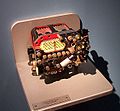Oil cooling
Under oil cooling means the heat dissipation means of oil as a heat carrier . Oil as a coolant has the advantage that it is electrically insulating, has a good lubricating effect and is also corrosion-inhibiting for metals. The disadvantages are the risk of fire, possible environmental hazards and the possible attack by organic materials. Oil also has a lower heat capacity than water.
Applications
Heavy current technology
Oil cooling is mainly used for power electrical devices such as transformers or starting resistors , whereby the oil also takes on the function of insulation (see transformer oil ). With oil cooling, the heat-generating element is located in an oil bath that is equipped with an expansion tank to compensate for fluctuations in the oil volume.
Internal combustion engines
In internal combustion engines in which the engine oil is exposed to increased thermal loads - this includes in particular air-cooled engines and those for racing use - this must be additionally cooled, since simple cooling via the oil pan , which is usually ribbed at the bottom, is not sufficient. An externally mounted (main or bypass) oil cooler in the engine's oil circuit has a greater effect.
(Water) cooler, oil cooler and air-cooled double-walled exhaust pipes of a Suzuki RE 5
Oil cooler on a Rolls-Royce Avon jet engine
Sectional view of the 25 HP boxer engine from a VW Beetle from 1945 with an oil cooler (yellow component, rear left)
Computer technology
Even PC hobbyists occasionally use oil to cool entire computer systems. Oil is a good electrical insulator , which means it cannot conduct any significant current. Therefore - unlike the water in a PC water cooling system - it can come into contact with the system without hesitation. So there are no short circuits even with leaks in hoses and heat sinks. You can even put the entire computer electronics (except for drives and other components with moving parts) in an oil bath and continue to operate normally. This technology can also be used if you want to overclock a CPU or GPU . With oil as a liquid heat conductor , the temperature drops - albeit not as much as with water cooling, since oils typically have a lower specific heat capacity than water - and there is no overheating. The type of oil is not so important. Normal cooking oil is also preferred by hobbyists because of its low price. However, it should be noted that cooking oil and other oils based on real fats (i.e. triglycerides of fatty acids ), in contrast to mineral oil or synthetic oils, become rancid over time when they come into contact with oxygen in the air ; the waste heat from the computer accelerates this process. It is therefore advisable to use transformer oil or acid - and resin - free silicone oil when cooling computer technology. Silicone oil is far less of a health concern than other non-edible oils. When using silicone oil, make sure that the computer case to be used (e.g. an aquarium) is not stuck with silicone , as silicone oil can dissolve any silicone.



